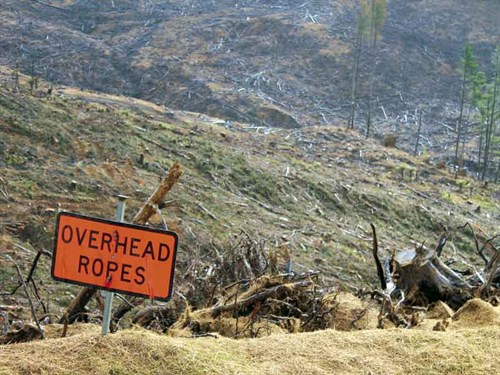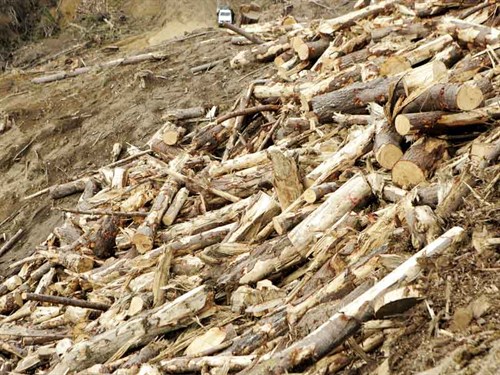Logger safety in New Zealand







|

|

|
Patrick Cox looks back at the year gone by in the forestry industry in his latest column
We are rapidly coming to the end of 2016, and if my research is correct, we have five loggers who will not be there for Christmas—a tough year compared to 2014 and 2015. It would appear that my old theory of increased production and demand for wood has a direct impact on the number of deaths in forestry. 2013 is an example of this with 10 deaths through the year. This just happened to coincide with the biggest forest harvest ever seen. When we rolled into 2014, with China’s economic slowdown amid falling log prices, an estimated 50 small logging contractors left the industry. The result of this was one death. 2015 was another quiet year with a three percent decline in volumes produced—the first decline in seven years—the result of which was three deaths.
Here we are in 2016, with production once more on the rise, and we have five fatalities. I guess we cannot put these sad deaths down to lack of experience as one logger had more than 20 years in the bush. I come back to the fact that we have had more than 25 years to get it right and we are still not there. Let us go back to 1987, when the Labour government created a deregulated environment. The pressure came on loggers and has never come off, and every government since then should be held responsible for chasing dollars over lives. Makes you wonder that when they set policy, is it like an army going to war where the generals expect a certain amount of casualties?
Both Labour and National play the blame game. They both brought about the demise of the Forest Service, a good breeding ground for training young loggers.
National sold half a million hectares of forest to private enterprise, and now in New Zealand, we have 15,000 forest owners and approximately 400 logging companies competing for harvest contracts. This has had a direct result on loggers’ take home pay over the years. That is not to say that good loggers are not paid well today. To be fair, they start very early in the morning and do not get home until late, and making an educated guess, we would expect they are averaging 12 hours a day from the time they leave home until the time they get back.

So what is the cure to stop this carnage? I’m going to put some ideas out there, some of which I might have touched on briefly in past articles. It will be well worth looking at options again.
One company I know employs up to a 100 staff working in a labour-intensive drilling industry. They operate a number of crews across the North Island. Every morning before starting work, they all have to fill out a questionnaire that covers basics such as how they feel when they get to work. I am not sure of the exact wording but this could be an example: sad, not happy, Ok, good, very good, excellent, feeling great, slept well.
Now, out of a crew of six, one guy is sad, two are OK, one is good, and two are feeling great. The management quickly looks at these results and the crew does not start work, as 75 percent are not in a good state of mind to work.
The company will meet the crew and try to work out the problem before starting work. One guy might not have slept well, another might have been involved in an argument with his partner, and one might be coming down with flu. Whatever the reason, the workers won’t be a 100 percent focussed on the job. Lack of concentration when working in any high-risk occupation could be the catalyst for an accident to happen.
Most harvesting logging companies have a toolbox meeting in the morning before they start work to discuss the day’s harvest plan and who works there and does what and how it should be done and how to do it safely. I guess all near-miss incidents and matters around safety are discussed. Does that person taking the toolbox meeting ask how his crew is feeling? It is fair to say that what happens at home has a huge impact on what happens at work. Employers also need to be extremely selective when employing new staff, someone who is multi-module for the task and does well with the theory and has managed to pass the practical exam does not always make a good bushman if he lacks common sense and an instinct for survival.
I employed a guy like this many years ago. Qualifications to burn; the first day I put him on the skidder, he promptly drove it into my partner’s ute!

We all know we are responsible for each other’s safety, but at the end of the day, it comes down to the individual. If you are instructed to do a job by your boss and you do not feel happy about it, do not do it. Don’t worry about the consequences, as it is better to be safe than sorry. If a tricky job appears, get help. One person’s opinion on how to solve it is not always the right way. Get a consensus opinion to come up with a solution to the problem. Ten minutes sorting out a dangerous situation is cheaper than shutting the crew down because of death or injury. The theory of increased production has a detrimental effect on men’s live has merit. It all comes down to dollars. Forest owners get one harvesting operation doing 600 hundred tonne per day. Why not get two crews doing 300 tonne per day? But that will never happen. The dollar rules and our governments let it happen.
What does the government do to help—introduce fines into the hundreds of thousands of dollars and talk about pot called the kettle black? As an individual logger, your survival in this dangerous industry is up to you. If a job does not feel right, do not do it. If you are not feeling a 100 percent, tell your boss at the start of the day. Make 2017 the year of the bushman. Go home, enjoy the Christmas break, get refreshed, and tackle the new year with a new sense of purpose and pride. You are loggers after all.
Keep up to date in the industry by signing up to Deals on Wheels' free newsletter or liking us on Facebook.

.jpg)






